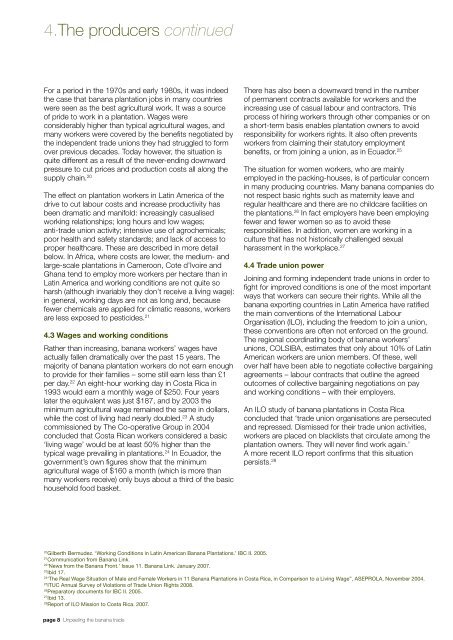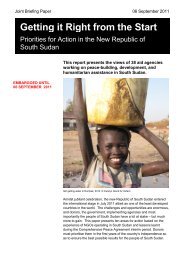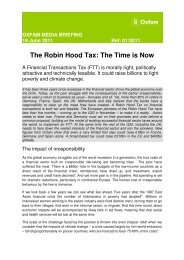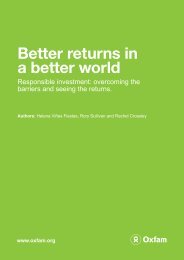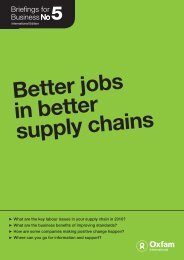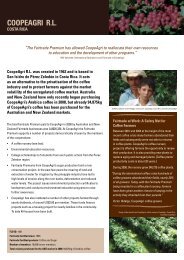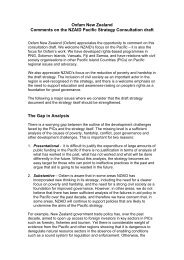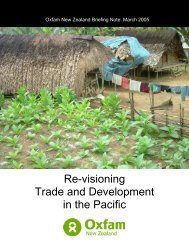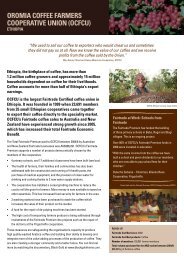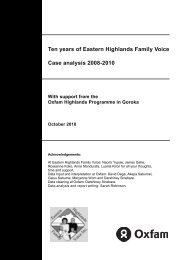Bananas: Unpeeling the Banana Trade - The Fairtrade Foundation
Bananas: Unpeeling the Banana Trade - The Fairtrade Foundation
Bananas: Unpeeling the Banana Trade - The Fairtrade Foundation
Create successful ePaper yourself
Turn your PDF publications into a flip-book with our unique Google optimized e-Paper software.
4.<strong>The</strong> producers continuedFor a period in <strong>the</strong> 1970s and early 1980s, it was indeed<strong>the</strong> case that banana plantation jobs in many countrieswere seen as <strong>the</strong> best agricultural work. It was a sourceof pride to work in a plantation. Wages wereconsiderably higher than typical agricultural wages, andmany workers were covered by <strong>the</strong> benefits negotiated by<strong>the</strong> independent trade unions <strong>the</strong>y had struggled to formover previous decades. Today however, <strong>the</strong> situation isquite different as a result of <strong>the</strong> never-ending downwardpressure to cut prices and production costs all along <strong>the</strong>supply chain. 20<strong>The</strong> effect on plantation workers in Latin America of <strong>the</strong>drive to cut labour costs and increase productivity hasbeen dramatic and manifold: increasingly casualisedworking relationships; long hours and low wages;anti-trade union activity; intensive use of agrochemicals;poor health and safety standards; and lack of access toproper healthcare. <strong>The</strong>se are described in more detailbelow. In Africa, where costs are lower, <strong>the</strong> medium- andlarge-scale plantations in Cameroon, Cote d’Ivoire andGhana tend to employ more workers per hectare than inLatin America and working conditions are not quite soharsh (although invariably <strong>the</strong>y don’t receive a living wage):in general, working days are not as long and, becausefewer chemicals are applied for climatic reasons, workersare less exposed to pesticides. 214.3 Wages and working conditionsRa<strong>the</strong>r than increasing, banana workers’ wages haveactually fallen dramatically over <strong>the</strong> past 15 years. <strong>The</strong>majority of banana plantation workers do not earn enoughto provide for <strong>the</strong>ir families – some still earn less than £1per day. 22 An eight-hour working day in Costa Rica in1993 would earn a monthly wage of $250. Four yearslater <strong>the</strong> equivalent was just $187, and by 2003 <strong>the</strong>minimum agricultural wage remained <strong>the</strong> same in dollars,while <strong>the</strong> cost of living had nearly doubled. 23 A studycommissioned by <strong>The</strong> Co-operative Group in 2004concluded that Costa Rican workers considered a basic‘living wage’ would be at least 50% higher than <strong>the</strong>typical wage prevailing in plantations. 24 In Ecuador, <strong>the</strong>government’s own figures show that <strong>the</strong> minimumagricultural wage of $160 a month (which is more thanmany workers receive) only buys about a third of <strong>the</strong> basichousehold food basket.<strong>The</strong>re has also been a downward trend in <strong>the</strong> numberof permanent contracts available for workers and <strong>the</strong>increasing use of casual labour and contractors. Thisprocess of hiring workers through o<strong>the</strong>r companies or ona short-term basis enables plantation owners to avoidresponsibility for workers rights. It also often preventsworkers from claiming <strong>the</strong>ir statutory employmentbenefits, or from joining a union, as in Ecuador. 25<strong>The</strong> situation for women workers, who are mainlyemployed in <strong>the</strong> packing-houses, is of particular concernin many producing countries. Many banana companies donot respect basic rights such as maternity leave andregular healthcare and <strong>the</strong>re are no childcare facilities on<strong>the</strong> plantations. 26 In fact employers have been employingfewer and fewer women so as to avoid <strong>the</strong>seresponsibilities. In addition, women are working in aculture that has not historically challenged sexualharassment in <strong>the</strong> workplace. 274.4 <strong>Trade</strong> union powerJoining and forming independent trade unions in order tofight for improved conditions is one of <strong>the</strong> most importantways that workers can secure <strong>the</strong>ir rights. While all <strong>the</strong>banana exporting countries in Latin America have ratified<strong>the</strong> main conventions of <strong>the</strong> International LabourOrganisation (ILO), including <strong>the</strong> freedom to join a union,<strong>the</strong>se conventions are often not enforced on <strong>the</strong> ground.<strong>The</strong> regional coordinating body of banana workers’unions, COLSIBA, estimates that only about 10% of LatinAmerican workers are union members. Of <strong>the</strong>se, wellover half have been able to negotiate collective bargainingagreements – labour contracts that outline <strong>the</strong> agreedoutcomes of collective bargaining negotiations on payand working conditions – with <strong>the</strong>ir employers.An ILO study of banana plantations in Costa Ricaconcluded that ‘trade union organisations are persecutedand repressed. Dismissed for <strong>the</strong>ir trade union activities,workers are placed on blacklists that circulate among <strong>the</strong>plantation owners. <strong>The</strong>y will never find work again.’A more recent ILO report confirms that this situationpersists. 2820Gilberth Bermudez. ‘Working Conditions in Latin American <strong>Banana</strong> Plantations.’ IBC II. 2005.21Communication from <strong>Banana</strong> Link.22‘News from <strong>the</strong> <strong>Banana</strong> Front.’ Issue 11. <strong>Banana</strong> Link. January 2007.23Ibid 17.24‘<strong>The</strong> Real Wage Situation of Male and Female Workers in 11 <strong>Banana</strong> Plantations in Costa Rica, in Comparison to a Living Wage”, ASEPROLA, November 2004.25ITUC Annual Survey of Violations of <strong>Trade</strong> Union Rights 2008.26Preparatory documents for IBC II. 2005.27Ibid 13.28Report of ILO Mission to Costa Rica. 2007.page 8 <strong>Unpeeling</strong> <strong>the</strong> banana trade


